How to Properly Recycle Plastic Bags and Plastic Film
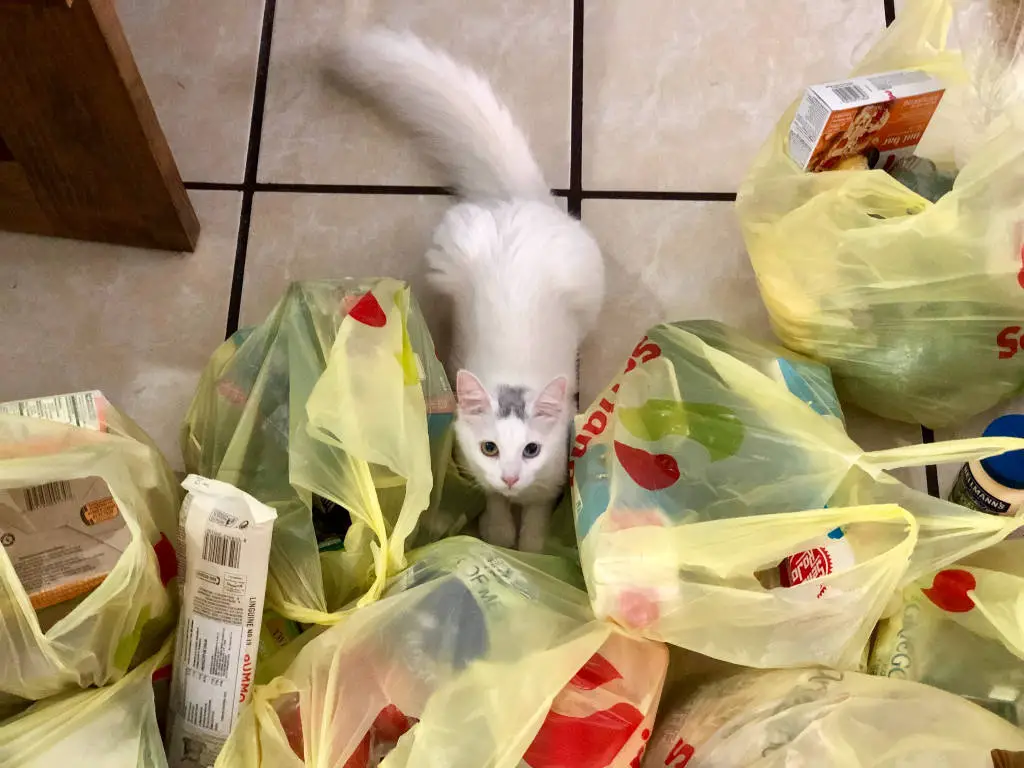
How to Properly Recycle Plastic Bags and Plastic Film
Disclosure: This post contains affiliate links. That means that if you click on one of them and make a purchase, I may earn a commission. Thank you for your support!

No matter how good you are about remembering to bring your reusable bags with you to the store, it seems like plastic bags and plastic film just keep piling up. Plastic film seems to be everywhere and is very difficult to avoid completely. Luckily you do not have to throw most of it out, as there are many retailers now that have bins set up to recycle plastic bags and plastic film.
First of all, be aware that plastic bags DO NOT go in your curbside recycling. This is because the bags get caught in the sorting machinery at the sorting plant and then everything periodically has to get shut down to untangle them from the disc sorters. If you want to recycle plastic bags and plastic film, you will need to take them somewhere that accepts them.
Yes, it would be really nice if there were one central place that took every type of recyclable, but so far in my community that is not the case. I take my aluminum and other metals to a metal recycler, plastic beer and soda can carriers to a local beverage store, paints and hazardous materials to the city, clothes to Goodwill, plant pots to Lowe’s, other specialty items to my county solid waste district offices, and so on. (These are the kinds of things that make me grumpy.)
What Types of Plastic Film are Accepted?
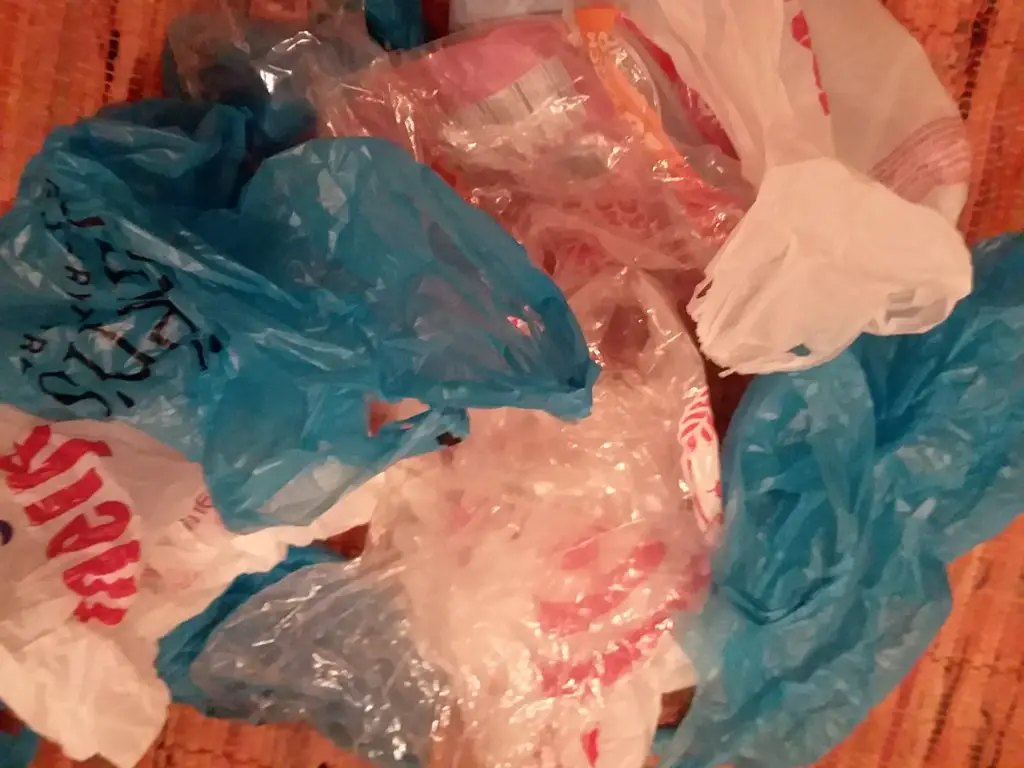
A good rule of thumb for whether a plastic bag or plastic film is okay to put in one of the recycling bins that take plastic bags is the quality of it. Pull on it a little. Does it stretch? If it does, it is probably recyclable. If not, then it is not.
So recyclable plastics would include things like:
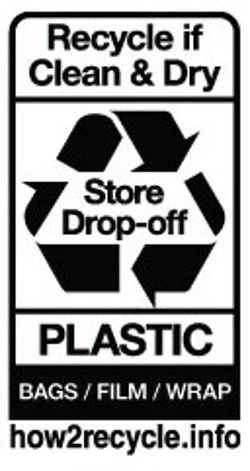
- Plastic grocery and takeout bags, bread bags, the plastic film wrapping around pallets of water bottles, zipper sandwich bags, produce bags, dry cleaning bags, wrap around things like a six-pack of paper towels, etc.
- Plastic mailers, plastic shipping envelopes and bubble mailers. Be sure that they are all plastic (not paper and plastic fused together), and remove the paper label.
- Bags marked with a #2 or a #4 recycling symbol, or the howtorecycle.info logo (see pictured). Not all bags will have this, but some brands have adopted it to make recycling rules clear. If you see one of these, just follow the instructions listed.
Might be acceptable:
- Bubble wrap and air pillows. Please visit this article on bubble wrap recycling for an update on this.
Plastic wrap and film that should NOT be included would be:
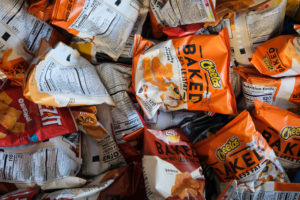
- Candy wrappers, chip and snack bags, really anything that is rigid with no stretch, or if it rips like paper.
- “Compostable” or “biodegradeable” bags. These bags are a whole other issue when it comes to whether they really degrade or are better or worse for the environment than regular plastic bags. But in any case they don’t go into the recycling bin.
- Cling wrap (Saran wrap, cellophane, whatever you prefer to call it). I know this one seems odd because it is clear and stretches and seems like it should qualify, but it’s not the same plastic as the other types of wrap.
- Really dirty or food-caked plastic wraps. These contaminate everything.
- Garbage bags, potting soil bags and the like.
Be sure to remove any receipts and papers from bags before recycling. If there are any stickers or labels on bags that cannot be peeled off, they should be cut off. Make sure all bags and film are clean and dry.
Where to Recycle Your Plastic Bags
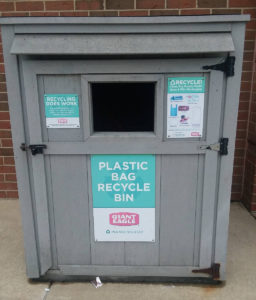
Many retailers like Giant Eagle, Target, Lowe’s and Kohl’s have bins set up to accept plastic bags. You can use this searchable directory tool on PlasticFilmRecycling.org to find drop-off locations near you.
If there aren’t any drop-off locations near you and you are really motivated to recycle your plastic bags, you can purchase a TerraCycle Plastic Bag Zero Waste Box and mail it back to TerraCycle for recycling. They have several different size boxes based on your needs.

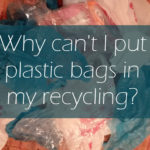



Where did you get the idea about the quality of the plastic film?
I believe you are mistaken. There are different kinds of plastic with different physical properties. Polyethylene is stretchable, polypropylene is not but both are indeed recyclable. I think it would be best to tax plastic and use the proceeds to recycle them properly. Definitely the issue should be studied.
Hi Israel, the stretch thing is a general rule of thumb, there may be some exceptions, but pretty much all the accepted plastic films in the US (according to PlasticFilmRecycling.com, which represents the industry) generally have some stretch to them and they mention that cereal box liners that tear are not accepted, but if they stretch, then they are okay. https://www.plasticfilmrecycling.org/recycling-bags-and-wraps/plastic-film-education-individuals/learn-whats-recyclable/
Also all the acceptable films they list in their FAQ are polyethylene. https://www.plasticfilmrecycling.org/recycling-commercial-film/businesses-collecting-post-commercial-film/plastic-film-education-post-commercial-film-collection/what-is-recyclable/
But as always, defer to whatever is listed on the side of the collection bin, because things change and it always depends on the locality.